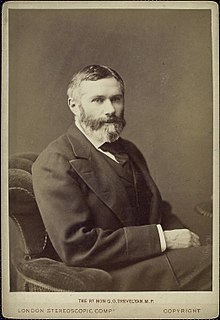George Trevelyan, 2nd Baronet
Sir George Otto Trevelyan, 2nd Baronet (born July 20, 1838 in Rothley Temple, Leicestershire , † August 17, 1928 in Wallington , Northumberland ) was a British historian and statesman in the William Gladstone government .
Life
He was the son of Sir Charles Edward Trevelyan, 1st Baronet and Hannah More Macaulay. When his father died on June 19, 1886, he inherited the title of Baronet , of Wallington in the County of Northumberland , which had been awarded to this on March 13, 1874 in the Baronetage of the United Kingdom.
On September 29, 1869 he married Caroline Philipps and had three sons with her: Charles Philips (1870-1958), Robert Calverly (1872-1951), George Macaulay (1876-1952).
He was at the Harrow School educated and graduated in 1864 his studies at Trinity College of Cambridge University with a Master of Arts (MA) from.
As a member of the Liberal Party , he was elected for the first time for the electoral term from 1865 to 1868 in the constituency of Tynemouth and North Shields as a member of the House of Commons . He was re-elected several times, serving for the Hawick District of Burghs from 1868 to 1886 and for the Glasgow Bridgeton constituency from 1887 to 1897 . From 1869 to 1870 he was a Lord of the Admiralty and from 1880 to 1882 Parliamentary Secretary to the Admiralty . In 1882 he was accepted into the Privy Council . From 1882 to 1884 he held the office of Chief Secretary for Ireland , 1884 to 1885 the office of Chancellor of the Duchy of Lancaster and in 1886 and from 1892 to 1895 the office of Secretary of State for Scotland .
In 1900 he was elected to the American Academy of Arts and Sciences and in 1904 to the British Academy . He was also awarded an Honor Doctor of Law (LL.D.) from Edinburgh University , Honor Doctor of Civil Law (DCL) and Honor Fellow from Oriel College, University of Oxford, and an Order of Merit (OM).
When he died in 1928, his eldest son Charles inherited his title of nobility.
plant
Among other things, his writings include a widely read monograph on the siege of Kanpur and the massacre of British women and children imprisoned in Bibighar . The historian Christopher Herbert calls George Trevelyan's writing clearly and elegantly written and without the semi-pornographic description of the bloody events that characterized a number of contemporary authors who also dealt with the Indian uprising . He was one of the early authors who criticized British officers such as James Neill , who were revered as "angels of revenge" in Britain immediately during and shortly after the Indian Uprising , for their approach. For example, he described James Neill as a monster responsible for murderous warfare.
Single receipts
- ↑ Christopher Herbert: War of no pity. The Indian Mutiny and Victorian Trauma , Princeton University Press, Princeton 2008, ISBN 978-0-691-13332-4 , p. 183
- ↑ Herbert, p. 192
Web links
- George Trevelyan at Hansard (English)
- Sir George Otto Trevelyan, 2nd Bt. On thepeerage.com
| predecessor | Office | successor |
|---|---|---|
| Charles Trevelyan | Trevelyan Baronet, of Wallington 1886-1928 |
Charles Trevelyan |
| personal data | |
|---|---|
| SURNAME | Trevelyan, George, 2nd Baronet |
| ALTERNATIVE NAMES | Trevelyan, George Otto |
| BRIEF DESCRIPTION | British historian and politician, member of the House of Commons |
| DATE OF BIRTH | July 20, 1838 |
| PLACE OF BIRTH | Rothley Temple, Leicestershire |
| DATE OF DEATH | August 17, 1928 |
| Place of death | Wallington , Northumberland |
